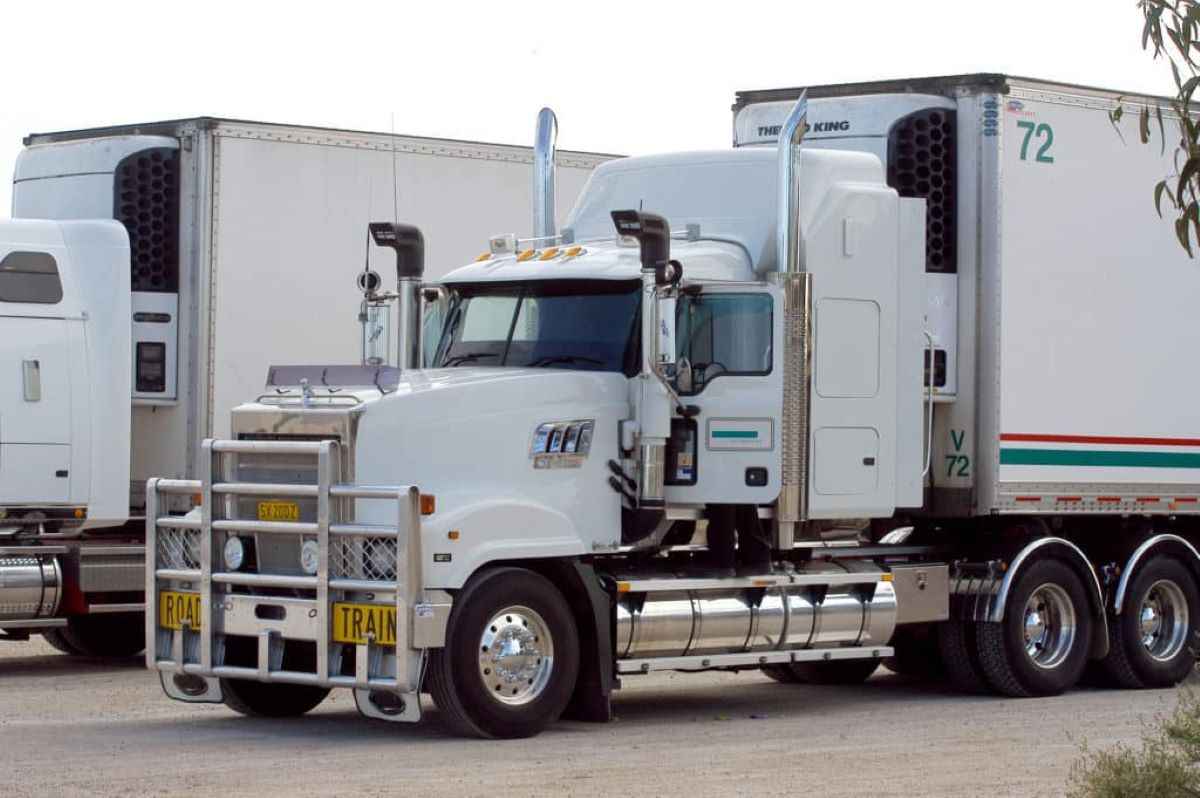Home>Finance>What Credit Score Is Needed To Buy A Semi Truck


Finance
What Credit Score Is Needed To Buy A Semi Truck
Published: October 23, 2023
Find out the required credit score for financing a semi truck and get the financial assistance you need to make your purchase.
(Many of the links in this article redirect to a specific reviewed product. Your purchase of these products through affiliate links helps to generate commission for LiveWell, at no extra cost. Learn more)
Table of Contents
- Introduction
- Factors to Consider When Buying a Semi Truck
- Understanding Credit Scores
- Importance of Credit Scores in Financing a Semi Truck
- Minimum Credit Score Requirements for Buying a Semi Truck
- Improving Your Credit Score for Better Financing Options
- Alternative Financing Options for Those with Lower Credit Scores
- Conclusion
Introduction
When it comes to financing the purchase of a semi truck, one of the key factors that lenders consider is the borrower’s credit score. Your credit score is a numerical representation of your creditworthiness, and it plays a crucial role in determining your eligibility for financing, as well as the interest rates and terms you may qualify for.
Buying a semi truck can be a significant investment, whether you’re a seasoned trucker looking to expand your fleet or a new owner-operator embarking on your entrepreneurial journey. Understanding the importance of credit scores in this process is vital, as it can affect your ability to secure financing and potentially save or cost you thousands of dollars in the long run.
In this article, we will delve into the topic of credit scores and their impact on purchasing a semi truck. We will explore the minimum credit score requirements set by lenders, as well as alternative financing options for individuals with lower credit scores. Additionally, we will discuss strategies to improve your credit score, which can open up better financing opportunities and potentially save you money over time.
Whether you’re considering buying a new or used semi truck, having a clear understanding of credit scores and their implications is essential. So, without further ado, let’s explore the factors to consider when buying a semi truck, starting with understanding credit scores.
Factors to Consider When Buying a Semi Truck
Before diving into the realm of credit scores and financing options, it’s important to take a step back and consider the various factors that should be taken into account when purchasing a semi truck. These factors can greatly influence your buying decision and play a significant role in determining the financial viability of your investment.
1. Purpose: Determine the primary purpose of your semi truck. Are you planning to use it for long-haul transportation or for local deliveries? Identifying your specific needs will guide you in choosing the right type and size of truck.
2. Budget: Establishing a realistic budget is crucial. Consider not only the purchase price but also ongoing expenses such as insurance, maintenance, fuel, and licensing fees. Factor in your expected revenue and ensure that your budget allows for these expenses without compromising your profitability.
3. New vs. Used: Decide whether you want to buy a new or used semi truck. New trucks typically come with a higher price tag but offer the latest technology, warranties, and potentially better fuel efficiency. Used trucks, on the other hand, may be more affordable upfront but may require greater maintenance and have a shorter lifespan.
4. Truck Specifications: Consider the specific features and specifications you require in a semi truck. This includes the size and weight capacity, transmission type (manual or automatic), engine power, sleeper berth options, and any additional amenities you may need for comfort and convenience on the road.
5. Financing Options: Research the various financing options available to you. This includes traditional bank loans, dealership financing, lease-to-own programs, and alternative lending options. Understanding your financing options will help you make an informed decision based on your credit score, financial situation, and long-term goals.
By carefully considering these factors, you can make a well-informed decision when buying a semi truck that aligns with your needs and financial capabilities. Now that we have covered the key factors to consider, let’s dive deeper into the world of credit scores and their significance in financing a semi truck.
Understanding Credit Scores
Before we delve into the importance of credit scores in financing a semi truck, let’s first understand what credit scores are and how they are calculated. Your credit score is a three-digit number that represents your creditworthiness and indicates the likelihood of you repaying your debts on time.
Credit scores are generated by credit bureaus, such as Experian, Equifax, and TransUnion, based on the information in your credit report. The most commonly used credit scoring model is the FICO score, which ranges from 300 to 850, with a higher score indicating better creditworthiness.
Several factors contribute to the calculation of your credit score:
- Payment History (35%): Your track record of making on-time payments, including any late or missed payments, collections, bankruptcies, and foreclosures.
- Credit Utilization (30%): The amount of credit you are currently using compared to your total available credit. Keeping your credit utilization low can positively impact your score.
- Length of Credit History (15%): The length of time you have had credit accounts open. Generally, a longer credit history is seen as more favorable.
- Types of Credit (10%): The different types of credit you have, such as credit cards, loans, and mortgages. Having a mix of credit types can benefit your credit score.
- New Credit Inquiries (10%): The number of recent inquiries and applications for new credit. Multiple inquiries within a short period may negatively impact your credit score.
It’s important to note that different lenders may have varying criteria for evaluating creditworthiness, and each lender may use a different credit scoring model. However, the factors mentioned above generally apply to most credit scoring models.
Now that we have a basic understanding of credit scores, let’s explore why they play a critical role in financing a semi truck.
Importance of Credit Scores in Financing a Semi Truck
When it comes to financing a semi truck purchase, your credit score plays a significant role in determining your eligibility and the terms of your financing arrangement. Lenders rely on credit scores to assess the level of risk involved in lending you money, and a good credit score can open up a world of possibilities for obtaining favorable financing options.
1. Loan Approval: A high credit score increases your chances of loan approval. Lenders are more likely to extend financing to individuals with a proven track record of responsible financial management. A good credit score demonstrates your ability to make timely payments and gives lenders confidence in your ability to repay the loan.
2. Interest Rates: Your credit score greatly influences the interest rate you will receive on your loan. A higher credit score can translate into lower interest rates, which in turn leads to significant savings over the life of your loan. On the other hand, a lower credit score may result in higher interest rates, potentially increasing your monthly payments and the overall cost of financing your semi truck.
3. Loan Terms: In addition to interest rates, your credit score can also impact the terms of your financing arrangement. A good credit score may provide you with more favorable loan terms, such as a longer repayment period or a lower required down payment. These flexible terms can make your monthly payments more manageable and improve your overall financial situation.
4. Access to Financing Options: A higher credit score opens up access to a wider range of financing options. Traditional banks and lending institutions typically have stricter credit requirements, and a good credit score can make it easier to secure financing from these institutions. Additionally, alternative lenders and lease-to-own programs may also consider your credit score when determining your eligibility and the terms of your financing.
It’s essential to recognize that a poor credit score can have the opposite effect. It can make it more challenging to obtain financing, limit your options to higher interest rates, and require more significant down payments. Understanding the importance of credit scores in financing a semi truck reinforces the need to maintain and improve your credit score before embarking on your purchase journey.
In the next section, we will explore the minimum credit score requirements set by lenders for buying a semi truck.
Minimum Credit Score Requirements for Buying a Semi Truck
While there are no universal minimum credit score requirements for buying a semi truck, lenders typically have their own criteria and guidelines. These requirements can vary depending on the lender, the type of financing, and the specific terms of the loan. However, it’s important to understand that a higher credit score generally increases your chances of securing financing and obtaining more favorable terms.
Traditional banks and lending institutions typically have stricter credit requirements compared to alternative lenders or lease-to-own programs. They may require a minimum credit score of around 650 or higher to qualify for financing. However, this requirement may vary, and some lenders may consider scores as low as 600 or even lower.
It’s important to note that credit scores are not the only factor lenders consider when evaluating your loan application. They also take into account your income, down payment amount, employment history, and overall financial stability. While a strong credit score can help compensate for any weaknesses in these areas, a low credit score may make it more challenging to secure financing even if you meet other requirements.
If your credit score falls below the minimum requirement of traditional lenders, you may still have financing options available to you. Alternative lenders, such as specialized financing companies or online platforms, may be more flexible in their credit requirements and consider borrowers with lower credit scores.
In addition, lease-to-own programs may be a viable option for those with lower credit scores. These programs typically have less stringent credit requirements and may focus more on your ability to make regular lease payments instead of your credit history. However, it’s important to carefully evaluate the terms and conditions of these programs to ensure they align with your financial goals and budget.
Ultimately, the minimum credit score requirements for buying a semi truck will vary depending on the lender and the specific financing options you pursue. It’s important to do your research, compare different lenders, and explore alternative financing options to find the best fit for your credit profile and financial situation.
Now that we have discussed the minimum credit score requirements, let’s explore strategies to improve your credit score and increase your chances of securing better financing options.
Improving Your Credit Score for Better Financing Options
If your credit score is not where you want it to be for financing a semi truck, don’t worry. There are several strategies you can implement to improve your credit score and increase your chances of securing better financing options. While it may take some time and effort, the benefits of an improved credit score are well worth it.
1. Make Timely Payments: One of the most crucial factors in improving your credit score is consistently making on-time payments. Pay all of your bills, including credit card bills, loans, and other debts, by their due dates. Late or missed payments can have a significant negative impact on your credit score. Set up automatic payments or reminders to ensure you never miss a payment.
2. Reduce Debt: Paying down your existing debts can help improve your credit utilization ratio, which is the amount of credit you are utilizing compared to your total credit limit. Aim to keep your credit utilization ratio below 30%. Consider creating a debt repayment plan and prioritize paying off high-interest debts first.
3. Limit New Credit Applications: Every time you apply for new credit, it results in a hard inquiry on your credit report, which can temporarily lower your credit score. Be mindful of applying for new credit unless absolutely necessary. Multiple inquiries within a short period can signal to lenders that you are seeking credit desperately, which may negatively impact your creditworthiness.
4. Keep Old Accounts Open: The length of your credit history has an impact on your credit score. If you have old, established accounts in good standing, it’s generally beneficial to keep them open. Closing old accounts can potentially shorten your credit history and lower your overall credit age, which can negatively affect your credit score.
5. Regularly Check Your Credit Report: Mistakes and inaccuracies on your credit report can lower your credit score unnecessarily. Regularly monitor your credit report to ensure that all the information is accurate and up to date. If you notice any errors, dispute them with the credit reporting agencies to have them corrected.
6. Use Credit Responsibly: Use credit cards and other forms of credit responsibly to demonstrate good financial behavior. Keep your credit card balances low and pay off your statement balances in full each month. Responsible credit usage shows lenders that you are a reliable borrower.
Improving your credit score takes time, patience, and discipline. Be consistent in implementing these strategies and avoid falling into old habits. Over time, you will see gradual improvements in your credit score, which can open up better financing options and potentially save you thousands of dollars in interest.
Next, let’s explore alternative financing options for those with lower credit scores.
Alternative Financing Options for Those with Lower Credit Scores
If you have a lower credit score and are finding it challenging to secure financing for a semi truck, there are alternative financing options available that cater to individuals with less-than-perfect credit histories. While these options may come with different terms and requirements compared to traditional lenders, they can still help you achieve your goal of owning a semi truck.
1. Alternative Lenders: Alternative lenders, including specialized financing companies and online platforms, often have more flexible credit requirements compared to traditional banks. They take into consideration factors beyond credit scores, such as your income, work history, and ability to repay the loan. These lenders are more willing to work with individuals with lower credit scores and may offer financing options specifically designed for borrowers in similar situations.
2. Lease-to-Own Programs: Lease-to-own programs can be an attractive option for individuals with lower credit scores. Instead of taking out a traditional loan, these programs allow you to lease the truck with an option to buy at the end of the lease term. The terms and conditions of these programs vary, but they generally have less stringent credit requirements and focus more on your ability to make regular lease payments. It’s important to carefully review the terms of the lease and ensure that they align with your financial goals and budget.
3. Co-Signer or Guarantor: If you have a trusted family member, friend, or business partner with a good credit score, you may consider asking them to be a co-signer or guarantor for your loan. A co-signer is equally responsible for the loan and their good credit can help strengthen your application. However, it’s important to recognize that if you default on the loan, it will also impact their credit score and financial standing.
4. Saving for a Larger Down Payment: Saving for a larger down payment can help offset the impact of a lower credit score. A substantial down payment can lower the loan amount and reduce the risk for the lender. It shows your commitment and ability to invest your own money into the purchase, making you a more attractive candidate for financing.
5. Credit Repair Services: If time is on your side and you’re not in immediate need of financing, you may consider working with credit repair services. These services can help identify and address any errors or inaccuracies on your credit report, as well as provide guidance on improving your credit score. While not a quick fix, engaging with credit repair services can be a valuable step in the long-term improvement of your creditworthiness.
Remember, when exploring alternative financing options, it’s important to diligently research and compare the terms and conditions, including interest rates, loan durations, and any additional fees. Read reviews and seek recommendations to ensure you’re working with reputable lenders or programs that have your best interests in mind.
Now that we have explored alternative financing options, let’s conclude our discussion on financing a semi truck.
Conclusion
Financing the purchase of a semi truck is a significant undertaking, and understanding the role of credit scores is essential to navigate the financing process successfully. Your credit score plays a crucial role in determining your eligibility for financing and the terms you may qualify for. While there are no universal minimum credit score requirements, lenders generally prefer borrowers with higher credit scores.
Factors such as payment history, credit utilization, and length of credit history are key in determining credit scores. Improving your credit score takes time and effort, but it can greatly increase your chances of securing better financing options and favorable loan terms. Strategies such as making timely payments, reducing debt, and keeping old accounts open can help improve your creditworthiness.
If your credit score is not where you want it to be, there are alternative financing options available. Alternative lenders and lease-to-own programs may be more flexible in their credit requirements, providing opportunities for individuals with lower credit scores. Additionally, considering a co-signer or saving for a larger down payment can also enhance your chances of securing financing.
In conclusion, when buying a semi truck, it is crucial to consider factors beyond just the credit score. Assess your needs, set a budget, and research the financing options available to you. Understand the requirements set by lenders and work on improving your credit score if necessary. By taking a proactive approach and exploring alternative financing options, you can achieve your goal of owning a semi truck and embark on a successful journey as a trucker or owner-operator.
Remember, each individual’s financial situation is unique, and it’s important to consult with financial advisors or professionals to determine the best course of action for your specific circumstances. With careful planning, responsible financial decisions, and a focus on improving your creditworthiness, you can pave the way for a successful and rewarding trucking career.














